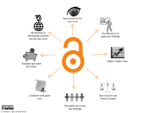Featuring open science board game ‘The Publishing Trap’, a publishing horror story and the importance of Wikipedia as a medical resource.
Open science: the board game via UK Copyright Literacy
UK Copyright Literacy has developed and released a board game – ‘The Publishing Trap’ – in which the brave protagonists must navigate the dog-eat-dog world of publishing. The game is free to download from the UK Copyright Literacy site.
The importance of rewarding negative results via Nature
The replication crisis is a fundamental threat to the scientific process and is exacerbated by the modern ‘publish or perish’ research environment. This article looks at the importance of incentivizing replication studies and the publication of negative results, and the steps that have already been taken.
Predatory publishing practices earn open access publisher OMICS an injunction via TheScientist
OMICS, who have long featured on Beall’s list of predatory publishers, has been handed an injunction by the Federal Trade Commission this week for problematic publishing practices such as ‘unorthodox’ impact factor calculations and unexpected charges.
Educational toolbox on open access via Johns Hopkins Sheridan Libraries
This site provides a great collection of resources on open access subdivided into useful categories: the basics of open access, directories of legitimate open access journals, funder requirements and faculty open access agreements.
The delay, waste and inefficiency caused by medical journals via BMJ Opinion
Richard Smith recounts the difficulties faced by a group of academics in their attempts to publish a large, pragmatic, randomized trial conducted in a middle-income country on a common and serious condition. Despite the high quality of the research – the trial was robustly designed, clearly reported and the results were conclusive – the study remains unpublished, years later, because it did not show improvement on its primary endpoint.
Why we need public peer review via Retraction Watch
The recipient of the first Publons Sentinel award, Irene Hames, has been part of the peer review community for more than 30 years. In this interview with Retraction Watch, she discusses the importance of publishing peer review reports alongside the published article, improving the efficiency of peer review systems and training researchers how to review.
Why not all researchers are happy with university open access policies via UK Copyright Literacy
This article asks a question not often discussed in the open science community: what if authors don’t want to publish in the open access journals mandated by their university? This has been a hot topic since a group of researchers in Konstanz, Germany, took their university to court on the grounds that the university’s open access policy unduly limited their freedoms; the answers to the question could have important ramifications for pharmaceutical companies developing open access policies of their own.
Wikipedia’s accuracy should be a priority for the medical community via BMJ Journals
Wikipedia is one of the most widely used medical information platforms in the world. It is thus very important to ensure that the information provided by the website is as accurate as possible. This essay suggests that quality assurance of health-related Wikipedia articles should be a priority for healthcare professionals.






